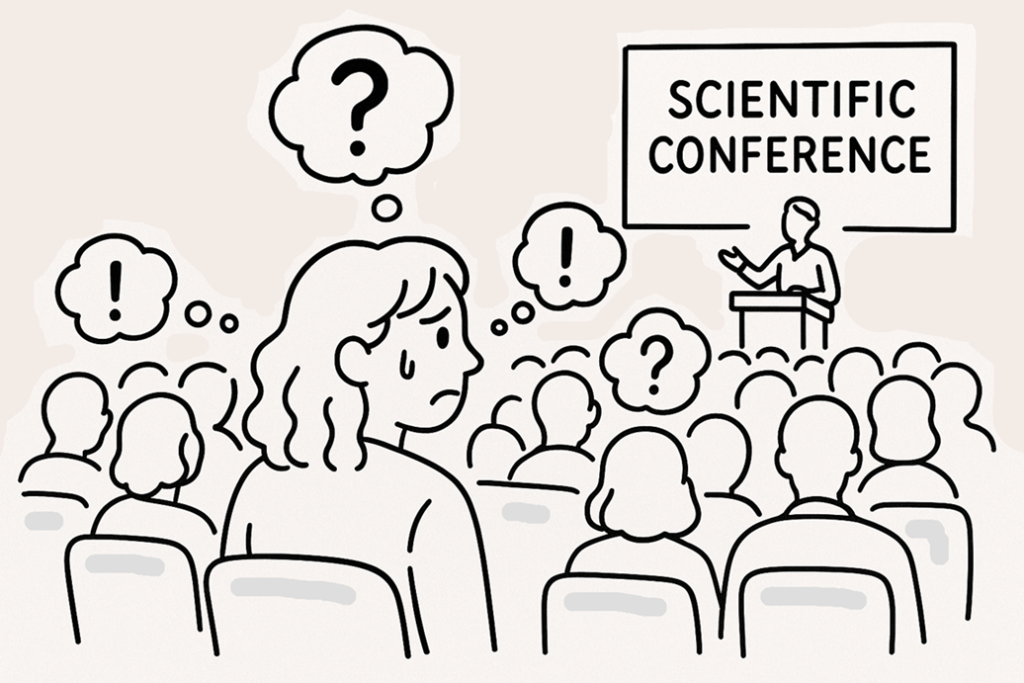Visiting a scientific conference for the first time as a young researcher is a big deal, don’t you think? So much expertise gathered in one place, so many talks and topics ahead — exciting, yes, but also a bit intimidating. At least, that’s how I felt when I drove nine hours in my car to a remote peninsula in Poland for the Baltic Earth conference. When I arrived, I knew nothing (like Jon Snow) and almost no one. I took a deep breath and just threw myself in. Looking back, it worked out fine — but of course, it could have gone better.
If you’re heading to your first or second conference and feel a little overwhelmed, here are some hacks to help you start on the right foot. Hopefully, they’ll make your conference a memorable experience — for your science, your network, and your self-confidence.
Let’s go!
- Be brave and ask your first question
If you’re attending your first conference as a young scientist, it takes a bit of courage to speak up and ask that first question – especially after a talk and in front of a big audience. You might think you don’t know enough about the topic to contribute, but that’s not true (usually😉)! Your question matters. If you didn’t fully understand something and want clarification, chances are others feel the same way. And who knows — your question might even spark a lively discussion.
And here’s more good news: once you’ve asked your first question, it only gets easier from there.
- Plan Breaks in your schedule
Talks, poster sessions, events – There is always a lot going on at conferences. FOMO, here we come, right? Take this as your reminder to breathe and accept that you simply can’t attend every session — and honestly, you shouldn’t. Rather make sure to plan plenty of breaks into your schedule! That’s not a sign of laziness — it’s actually smart. Long lunch or coffee breaks are the perfect time to chat, connect, and have real one-on-one conversations with other interesting researchers.
- Find a peer group
Especially if – like in my case – no one else from your research group or university is attending the conference with you, finding a peer group is essential. Not necessarily for scientific exchange, but to make you feel comfortable and confident during your stay at the conference and to simply have a good time (because that’s what it’s really about in the end – personal opinion from a PhD quitter).
The easiest way to start is by connecting with people who are around your age or at a similar career stage — like students, fellow PhDs, or young postdocs. You can also check the conference website beforehand for buddy programs or mentoring initiatives — most larger conferences offer something like that.
- Set simple networking goals
Of course, you want to expand your scientific network at a conference. But that doesn’t mean you have to meet and talk to everyone – especially not at big conferences where the crowd can be huge and honestly overwhelming. Instead, focus on making just two or three interesting connections in your general field of research – that’s already a great start.
Also: those two or three people don’t have to be professors. Connecting with other students or early-career researchers can be just as valuable for sharing ideas, getting input, or even starting future collaborations.
- Have a question ready in your head
This hack is simple but effective: have a few go-to questions ready in your mind for when you meet other scientists during poster sessions or coffee breaks. It makes starting a conversation much easier. Some general questions that basically work with everyone can be for example:
- “What are your next steps?”
- “Have you tested or seen this in other regions?”
- “What were the biggest challenges in your research?”
- “Is your research part of a larger project or collaboration?”
It kind of goes without saying, but ChatGPT can help you come up with even more questions.
- Use your Phone for Notes:
Collecting business cards is fun and feels professional but it’s also pretty old-school — and let’s be honest, you’ll probably lose them at some point anyway. It might work better for you to use your phone to take a few quick notes after talking to people: What’s their name, position, research field, and what are they currently working on. That way, you’ll still remember who’s who, what they research, and how they might be helpful to you — even months later.
If you’re a fan of physical business cards, there’s of course no harm in collecting them and using them to share your own contact information. In that case, consider adding a QR code to your card that links to your university profile.
- Connect on social media
Also obvious, but still worth mentioning: After meeting someone interesting at a conference, don’t let the connection fade! Following each other on platforms like LinkedIn, ResearchGate or even Instagram is a great way to stay in touch. You can keep up with their work, your ongoing interest and share ideas, maybe even start collaborations – all without having to track them down months later. A quick tip: send a short message when you add them, so they remember who you are. A little personal touch goes a long way!
Have a great conference experience!
Tanita
